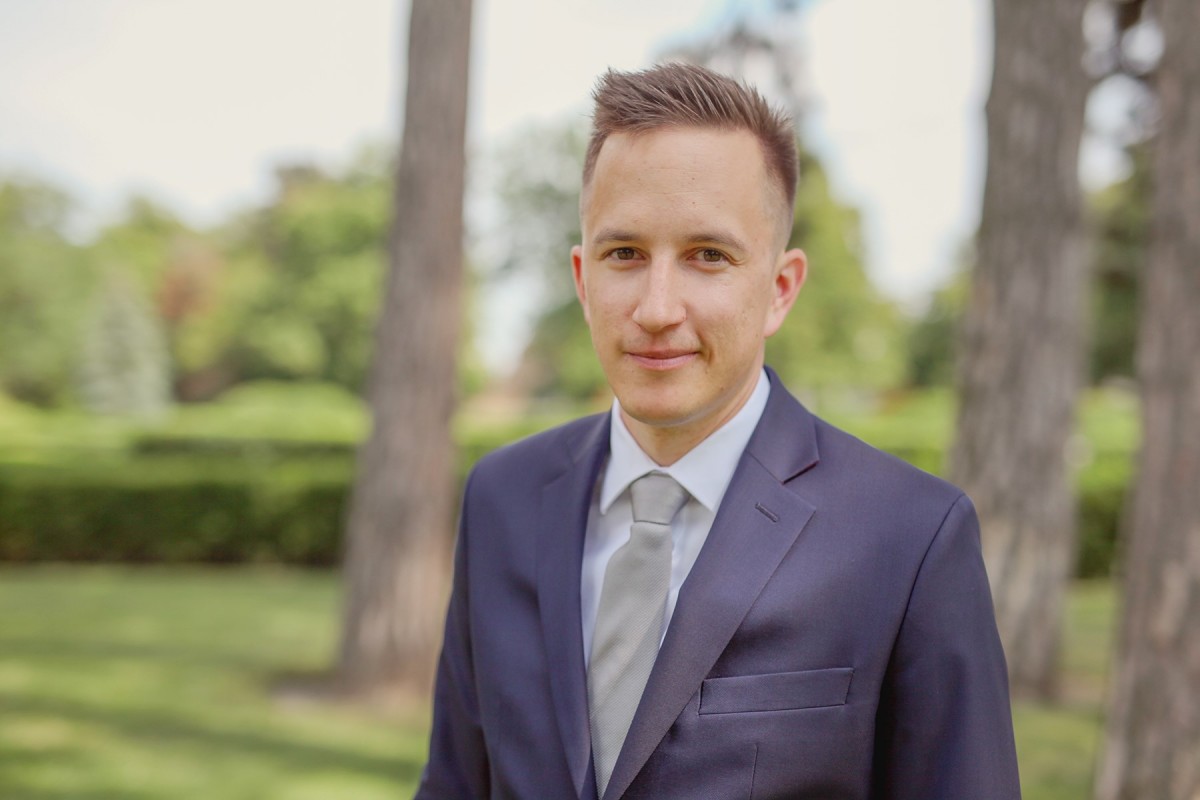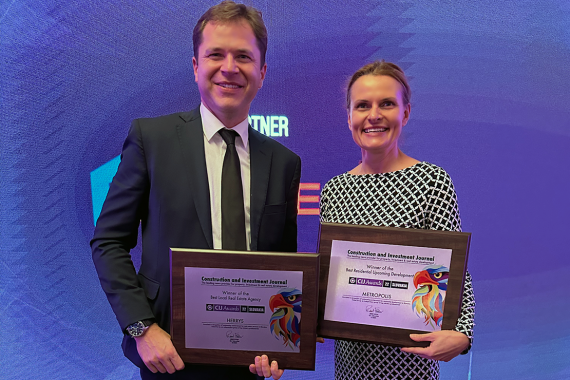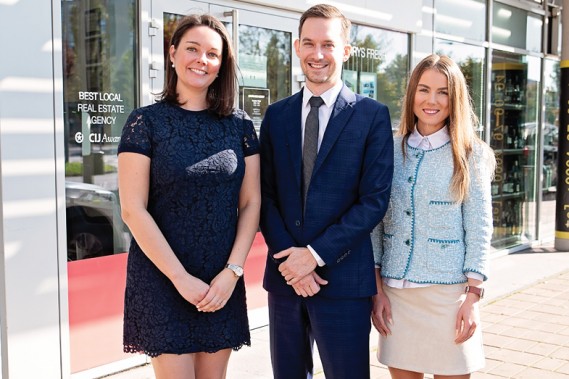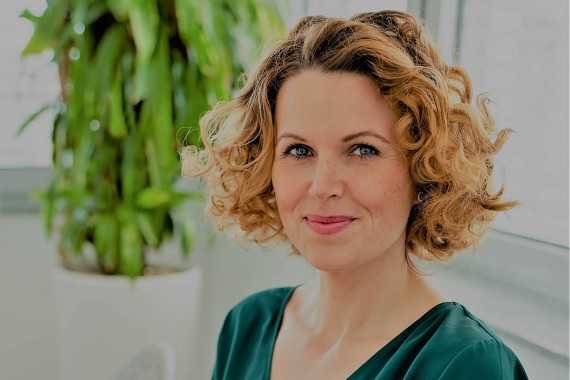Michal Liszkay is one of the most experienced experts in the management of development projects on the Bratislava real estate market. He started as a salesman, later gained extensive experience in the comprehensive preparation of development projects. Over the course of his 13 years in real estate, he has witnessed historic changes in our market. This journey has brought Michal to new approaches and ideas for solving residential housing. In the summer of 2021, he joined the RK Herrys consulting team focusing on new buildings, and together they are preparing a new model of expanded consulting for developers.
When did the world of real estate catch your eye and how did you get to it?
I started working in real estate while studying foreign trade at university. I originally sold the projects as a broker directly to the developer and later I transitioned into the preparation phase of development projects. The beginnings were “fun” because I started working in September 2007, at the peak of the real estate boom. I remember, for example, that on Christmas Day we signed eight properties. Since I was also studying, it was quite a rush.
After long-term growth, 2008 saw disruption and a collapse in the real estate market. How did you personally perceive that situation from the point of view of a young active person with a well-launched career?
I was 21 when the signs of the recession from the West became obvious in our country, and I experienced it at the very beginning of my career. Lehman Brothers went bust in America, followed by mortgage banks Fannie Mae and Freddie Mac. This situation did not affect us for a long time, and I even remember that there was a time when we thought Slovakia will buck the trend, even though people in America were at that moment losing their savings, their jobs, their homes. In the end, though, the contrary turned out to be true and the recession hit us, too. It was a shock, it came quite suddenly, from one month to the next. A total fall from euphoria.
What stayed with you from these events?
I took this as a warning, for the rest of my career, I mean that it is easy to plan in and for the good times, but one must be cautious, because bad times always come out of the blue. On the basis of the crisis existing in the outer environment, the management of the parent companies of our banks decided that the banks here in Slovakia were to suspend project financing and housing loans for retail. All this while our banks were in good health. By doing so, they pulled the plug on the real estate market. The recession turned up quite unexpectedly and sales stopped overnight. “Nothing” got sold in Bratislava at the time, and it shocked everyone. Up until then, I had been used to seeing property sell as if there were no tomorrow. Back in August 2008 we still had normal sales and from September to January we did not sell a single unit and the sales kept going at very low figures for months. It was a drop that no young person ever expects. I have carried this warning with me ever since.
Is it possible to prepare in advance for such a crisis?
Sometimes it is not possible to predict what will happen. But each of us can create a reserve and prepare our own crisis plan. “Be ready for catastrophic scenarios” – everyone says, but in reality few people prepare for a crisis, as everyone hopes that none will come. Yet, crises can come at any moment. I try to apply this experience. Always be prepared for the really worst scenario, which means that there are no sales for months, there is no financing and there is a possibility that you will not survive economically. In Bratislava, we know of a number of private buildings under construction since 2009 that were not completed. Few remember it today, but back in 2014, selling real estate was not a “piece of cake”. The market did not recover until 2016. Well, today, we have the extreme opposite.
The recession lasted almost eight years. People who worked in the real estate industry must have been taken aback by this. Weren’t you thinking about a change back then?
At one point, I toyed with an idea of moving on to another profession. I also had more financially interesting offers, for example in financial brokerage, where the remuneration was insanely high. But I am a person who needs to see the material outcome of his work. The virtual result would not satisfy me. I like to see the projects I work on when they are built. I have been playing with Lego since I was a child and in a way I see this as playing Lego.
What kept you in real estate despite the demanding situation?
Since I’ve always been interested in macroeconomics, I knew that one day it would pass, all that one had to do was to hold out. Because I worked for a developer, my job was not just about sales. When we were not selling, we were preparing the next stages of projects, or we were taking care of our clients in the after-sales service. I don’t like being bored; therefore I’ve always found some activity to do. Thanks to the owners of the company, I had the opportunity to experience various activities related to the entire life of a development project. I worked in the legal department, with project managers, I went to construction sites, I handed over constructions. I experienced first-hand the whole process of project planning and construction. And once I got this comprehensive, “helicopter”, view of the things I realised what developers lacked to make a perfect offer, to be more efficient, and avoid unnecessary mistakes.
Can you reveal more about that?
I was preparing a large housing estate project for a developer from the ground up, and it was really important for me that people would enjoy living there even over several decades. When we were deciding about layouts, even though we had enough analysis information, I questioned myself on how to do things even better. I thought about how we could optimise the whole project so that it would be beneficial both for the investor and the buyer. In conclusion, I always asked myself a question: “Did we do it well?”
This is a noble and responsible intention – “for people to enjoy living there.” What’s your plan?
I realised that if I wanted to address our offer to best match market demand, I needed to move to a stage where the project was still being planned and when it was still possible to influence what it would look like. Knowing this, I think it is necessary to start much earlier, before the developer gives the assignment to the architect.
What brought you to HERRYS in this regard?
I met Filip and Katarína from HERRYS during our previous activities, we have known each other for 12 years. At one point, Filip Žoldák and I came to the conclusion that we had the same type of thinking and intentions. I have experience from my work on the part of the developer, from which I have learnt a great deal. However, I lacked one important piece of the mosaic in my knowledge, and that piece was something that, in my opinion, Herrys does best. Namely, detailed statistics from projects and feedback from a larger number of clients. Our common goal and desire is to prepare and optimize new projects to meet the needs of the market as closely as possible between the sales team and the preparation team of which I have become a part. Through our consulting, we want to bring added value to development projects, so that these projects bring people the housing they envision.”
What do you see as your contribution to Herrys?
My biggest contribution is that I know the entire development process from its initial preparation of the project through to its end. This represents a body of experience with preparation – I have participated in over 700 deals. And now, together with Filip Žoldák, we are bringing this knowledge and experience together with Herrys’ know-how and applying them jointly to new projects. Through our consulting, we want to bring unique added value to development projects.
How do you like it in the HERRYS team?
At HERRYS, I really like how the company owners have their roles divided, that everyone has their own portfolio, and everyone is great in their area. HERRYS hosts a family atmosphere with Katarína successfully keeping the fire going, which is why this is an excellent job from my point of view. The company creates a good environment for the development of its staff, which is an investment on the one hand, making people obviously content here, on the other hand. You can see and feel it every day that the Herrys people love to go to work. And that’s great.
Is there a project, even a foreign one, that inspired you in your inclination and thinking about how an ideal project should look?
I really like the project of the new district next to the central station in Munich, Bavaria – Arnulfpark. It’s a great piece of urbanism next to a major thoroughfare. The project includes more than a thousand apartments and offices for 4 000 people, and in the middle of it there is a huge park. Everything works great together – smooth. Of course, here in Bratislava we look most often towards Vienna or Prague. In Vienna, there is an interesting Viennese housing estate Seestadt Aspern in the 22nd district, built by the city and I think it is a model of development where the city joins forces with the private sector and creates something meaningful. The location has both rental apartments and commercial apartments. What I like most about this housing estate is that it lives on “Sunday as well as Tuesday.” I lived in the 21st district for two years, so I often went to “spy” there. In our country, projects often turn out to be dormitories, and we need to improve that. I would like to participate in helping create projects where people will not only stay but also spend their free time. I think that at some point here in Bratislava we, too, could commit to such a project.
Do you have a personal motto that inspires you in your work?
Štúr said: “There is no way back, only ahead is the path.” That’s how I view life. One day I make a decision, the next morning I wake up, confront myself as to whether the decision was a good one, perhaps I correct it somehow, but in fact I have to go ahead. I analyse my previous decisions, but I always try to look to the future. And even if those decisions were no good, there is no way to go back. However, there are lessons to be learned.
And then I have another: “Believe, love, work,” used by Štefánik. It is important to believe that what we are doing makes sense. To love – when we look at it in relation to work, then it means passion for or commitment to work. It is also important not to stop working and asking myself every day what I did well yesterday. Right now I am reading a new Štefánik’s biography by Michal Kšiňan, which I recommend.
What else do you do in your free time?
I try to read a lot, every free moment I have I listen to audiobooks, physics lectures or political podcasts. I watch economic programmes to keep up with the happenings. I endeavour to spend the 16 productive hours a day working or educating myself. Some enjoy watching soap opera or football, I enjoy podcasts. I follow investors in stocks a lot. The world of finance is connected to the world of real estate. I follow the popular Ray Dalio or even Peter Schiff, who is a sort of a catastrophe preacher. He has been saying for ten years that the world is about to collapse, but I personally, on the contrary, look at the world positively and believe that tomorrow will be better. In this way, I confront myself and my optimistic vision of economic reality. Economy is also interlinked with politics, so I try to keep track of current political events. Because political turbulences are often reflected on the markets and from there on the real economy. It always takes some time to see the impact in real life. In conclusion, I will just add that in addition to work, I am dedicated to my family and also active in sports. I have been playing senior floorball for the Hurikán Bratislava club for 16 years.
Note:
Peter David Schiff is an American stock broker, financial commentator. He is CEO and chief global strategist of Euro Pacific Capital Inc.
Raymond Thomas Dalio is an American billionaire, investor and hedge fund manager. Since 1985, he has been a co-investor in the world's largest hedge fund, Bridgewater Associates. Dalio is considered one of the greatest innovators in the financial world.
In the second part of this interview, we will bring you more details about the mentioned expanded concept for developers.




